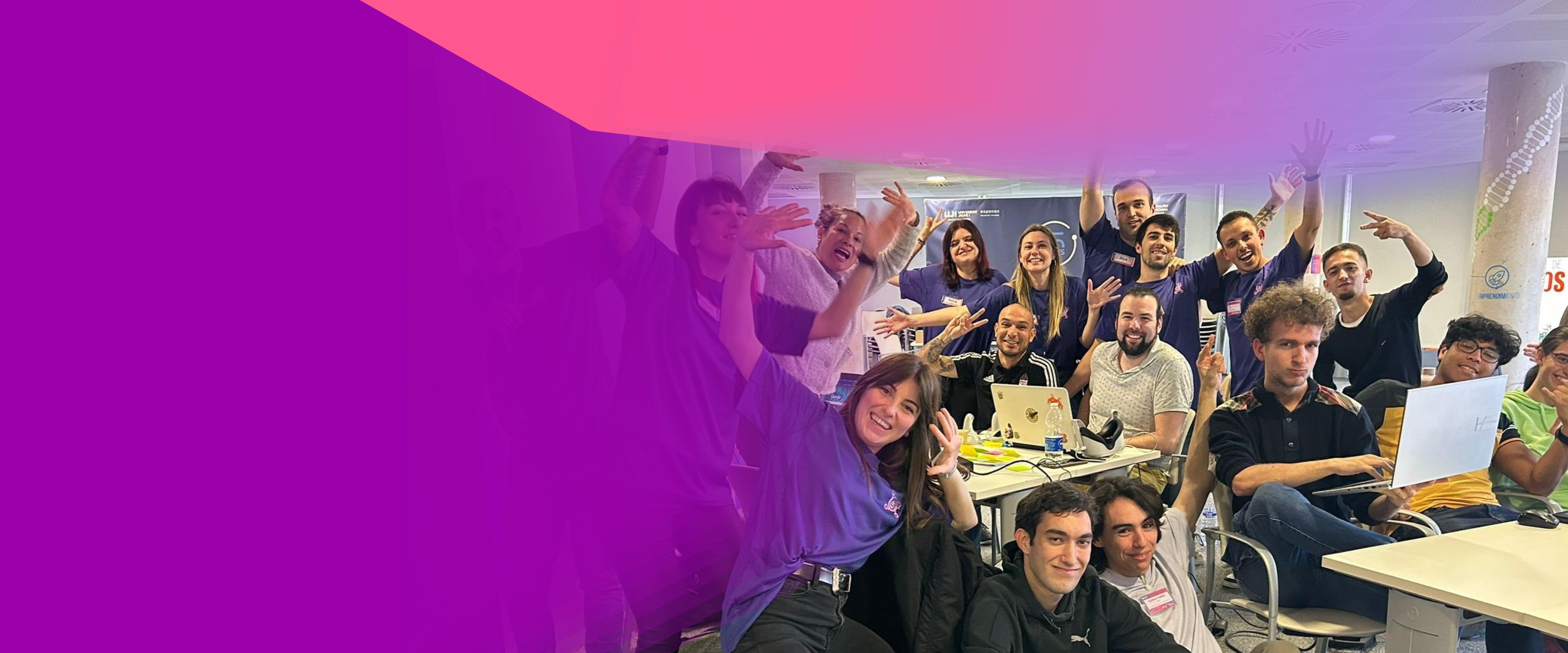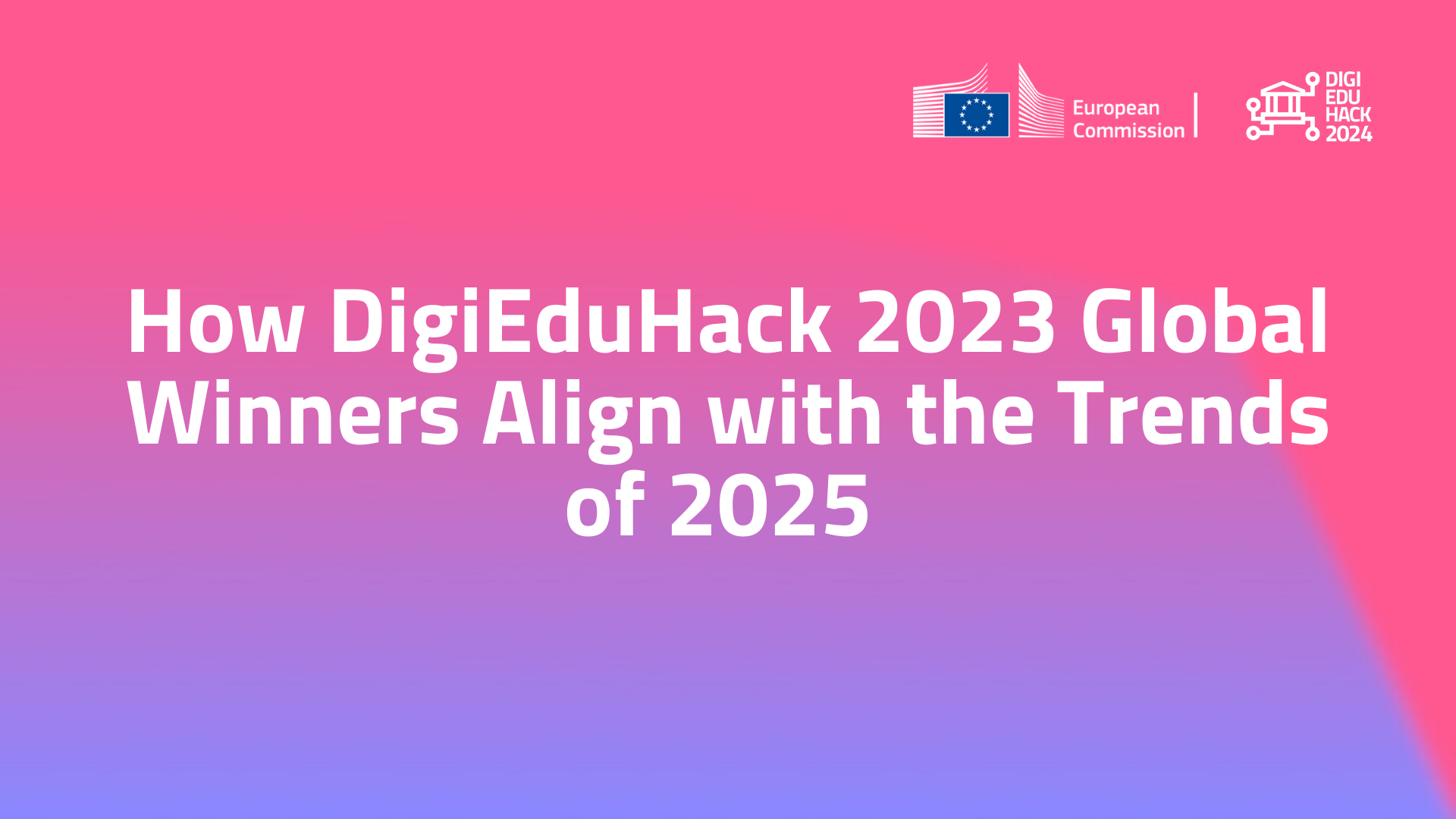How DigiEduHack 2023 Global Winners Align with the Trends of 2025
As we step into 2025, the world of education continues to evolve at a rapid pace, driven by technological innovation and the growing need for inclusive, accessible learning. Several key trends are shaping the future of digital education, offering both opportunities and challenges.
The Global Winners of DigiEduHack 2023 have developed projects that reflect many of these trends, showing how the future of education is already being shaped by creativity, technology, and collaboration. But first; let’s have a look at the trends coming for 2025:
1. Artificial Intelligence as a Learning Partner
AI remains a game-changer in education, offering tailored learning experiences and data-driven insights. From virtual tutors and AI-powered content recommendations to automated assessments, the potential of AI to personalise education is vast.
2. Immersive Learning with Virtual Reality (VR) and Augmented Reality (AR)
Immersive technologies are revolutionising education, making learning more engaging and interactive. VR and AR enable students to explore complex concepts, historical events, and distant locations in a hands-on way, regardless of their physical environment. Example.
3. Gamification of Education
Gamified elements—such as leaderboards, achievements, and game-based learning modules—are becoming essential tools to boost motivation and retention. By blending play with education, gamification helps learners achieve their goals in a fun and engaging manner. Example.
4. Data-Driven Education
The increasing availability of data in education is enabling institutions to adopt evidence-based decision-making. Learning analytics and dashboards help educators identify gaps in understanding, predict student performance, and customise teaching strategies. However, ensuring ethical use of data and maintaining student privacy remain critical considerations.
5. Inclusivity and Accessibility Through Technology
Technology is breaking down barriers to education for individuals with disabilities and those in underserved communities. From text-to-speech tools to remote learning platforms designed for low-bandwidth areas, inclusivity is a core focus for educational technology in 2025.
6. Microlearning and On-Demand Education
Short, focused learning modules are becoming increasingly popular as learners seek flexible options to upskill or reskill. Platforms offering bite-sized lessons cater to busy professionals and students alike, aligning with the global shift towards lifelong learning.
7. Sustainability in Education
Sustainability is no longer just a topic within education—it is a driving principle shaping how educational institutions operate. From eco-friendly infrastructure to teaching sustainability through digital platforms, the integration of green practices is gaining momentum.
How DigiEduHack 2023 Global Winners Align with the Trends of 2025
Projects developed by DigiEduHack’s 2023 Global Winners reflect a deep understanding of these emerging trends, addressing key challenges and providing innovative solutions for the future of education.
Here is a look at how their work aligns with the trends we are seeing in 2025:
- ADAPTATEC: This platform is a prime example of Artificial Intelligence as a Learning Partner. By leveraging AI, ADAPTATEC tailors learning experiences to each student's cognitive profile and ensures that students with diverse needs can access personalised education. Through text-to-speech and adjustable fonts, it ensures that every student has the tools they need to succeed in an inclusive and accessible manner. Additionally, it uses data-driven insights to help educators track progress and provide targeted support, perfectly reflecting the trend of Data-Driven Education.
- Artificial Reality: This project embodies the trend of Immersive Learning with VR and AR by using Virtual Reality to create an interactive learning environment for STEM education. It removes geographical and economic barriers, offering students immersive learning experiences that help them grasp complex scientific concepts in a virtual space. By focusing on accessibility and equal opportunities for students with disabilities, this project aligns with both the Inclusivity and Accessibility trend and the Immersive Learning trend.
- EdMap: While EdMap does not explicitly gamify the learning process, it provides the opportunity to engage in real-world industry roles, such as software engineer or project managers. This immersive approach to education with role-playing in a simulated work environment aligns closely with the Gamification of Education trend.
- IVAN: The social network IVAN focuses on building a sense of community around sustainability, making it a perfect fit for the Sustainability in Education trend. IVAN fosters critical thinking and action toward sustainability by encouraging students to engage in volunteer activities and taking part in eco-friendly challenges, it also promotes Lifelong Learning, as students are continuously involved in educational activities that extend beyond the classroom.
As we look toward 2025, the trends in digital education are set to redefine teaching and learning. The innovative projects from DigiEduHack’s 2023 global winners already reflect these trends, showing how technology is transforming education. From AI to immersive learning and sustainability, the future is bright.
With the announcement of DigiEduHack Global Awards finalists of 2024 on the horizon, we are excited to see the next wave of solutions that will continue to shape the future of education. Stay tuned for even more groundbreaking ideas that will make learning more accessible, personalised, and impactful for all.

